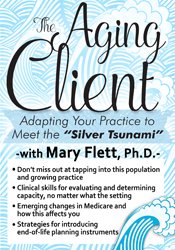

Adapt your practice to work with this huge flood of baby boomers, the “Silver Tsunami” and get more referrals from practitioners. You are uniquely situated to help this population meet the Medicare/Medicaid requirements in treatment. Learn where behavioral health fits within the continuum of care and grow your practice before it’s too late!
Position yourself as a key partner in achieving the goals set for patient management. Knowing what is required of you, the behavioral health provider, in different settings and developing your skills in working with aging clients will make you an invaluable partner in the changing field of aging.
If you are considering working with aging adults, this seminar will give you a firm foundation to start your work and enter into the expanding market whether it be outpatient, assisted living, skilled nursing, or in-patient. If you are already working with aging adults, you will benefit from honing your skills and learning how to maximize your reimbursements.
Transform your practice as the “Silver Tsunami” stretches the boundaries of healthcare and find your niche in treating older adults.
| File type | File name | Number of pages | |
|---|---|---|---|
| Manual (6.26 MB) | 88 Pages | Available after Purchase |
Mary Flett, Ph.D., has been a sought-after teacher and trainer for over 30 years. She is a licensed clinical psychologist who focuses her practice on aging issues and behavioral rehabilitation, partnering with medical professionals, integrative medicine practitioners, and complementary healing providers. Dr. Flett has worked in private practice, community-based agencies, and has provided services in both state and county government behavioral health systems.
In addition to her clinical work across the developmental spectrum, Dr. Flett has conducted evaluation and outcomes analyses and quality improvement studies for county and state government. She has taught at both the undergraduate and graduate levels, and was formerly affiliated with the Master’s in Counseling Program at Sonoma State University in California. Dr. Flett is the author of Mastering the DSM-5®: Integrating New & Essential Measures Into Your Practice (PESI, 2014).
Prior to becoming a psychologist, Dr. Flett spent 10 years working as a legal assistant in the areas of family law, criminal law, probate and tax law, and public law. Dr. Flett studied improvisation at the famed Second City in Chicago and performed stand-up comedy. She has a remarkable wit and ability to present information in a lively and engaging way.
Speaker Disclosures:
Financial: Mary Flett is in private practice. She receives a speaking honorarium from PESI, Inc. She has no relevant financial relationships with ineligible organizations.
Non-financial: Mary Flett has no relevant non-financial relationship to disclose.
TREATING THE OLDER ADULT
NAVIGATING SYSTEMS OF CARE
CAPACITY & COMPETENCY EVALUATION
TOOLS
FAMILY INTERVENTIONS & END OF LIFE PLANNING
COORDINATION OF CARE
DOCUMENTATION
ETHICAL & LEGAL ISSUES
Please wait ...